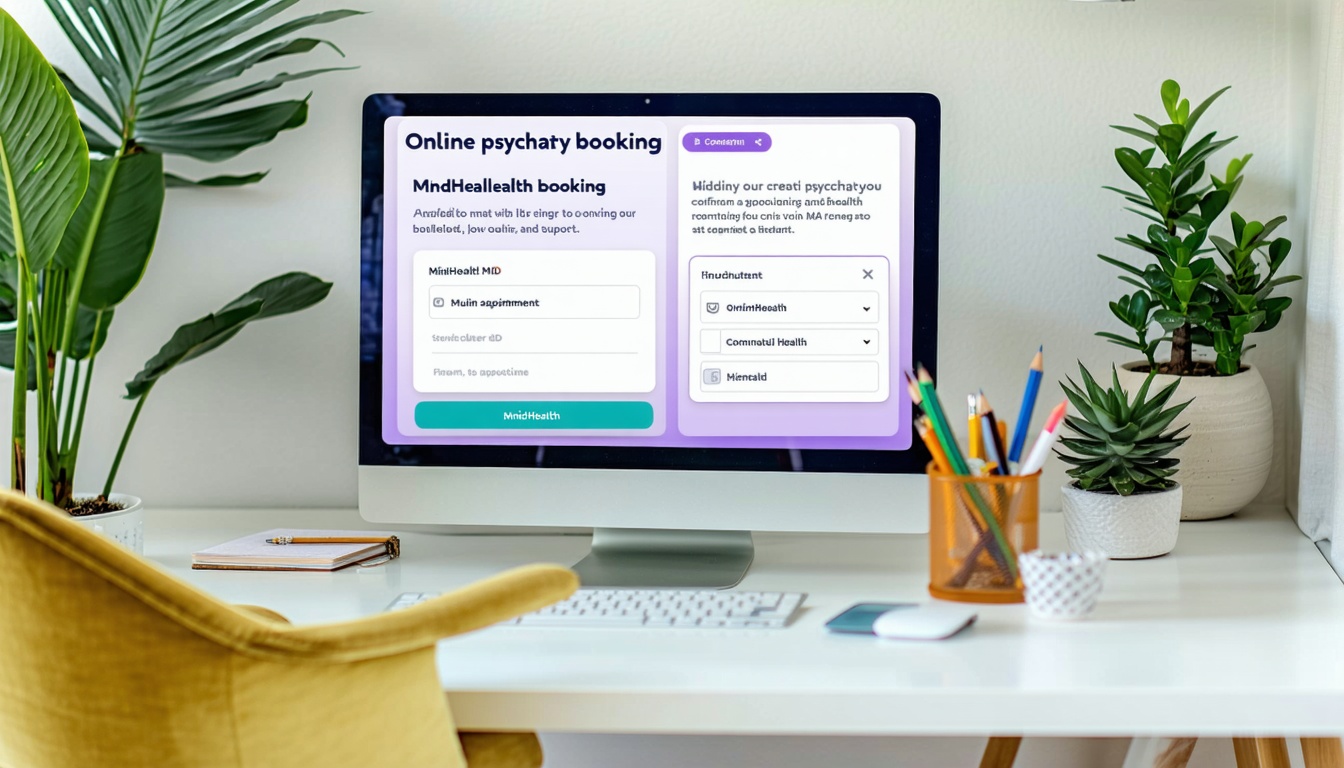If you’re looking into PTSD psychiatric care for yourself or a loved one, you already know how overwhelming untreated post-traumatic stress can feel. Maybe you’ve noticed flashbacks or nightmares creeping in at night, or perhaps it’s the sense of constant tension in everyday routines. Whatever your experience, real help is out there for you, and you don’t have to face this alone. At MindHealth MD, we offer telehealth psychiatry, medication assisted treatment (MAT), and transcranial magnetic stimulation (TMS) options to help you navigate the challenges of PTSD. Below, we’ll walk through the basics of PTSD, why expert intervention matters, and how our services bring you closer to a healthier, more fulfilling life.
Explore PTSD and its toll
PTSD (post-traumatic stress disorder) is a condition that can develop after a traumatic event involving an actual or possible threat of death, violence, or serious injury [1]. But let’s be honest, you don’t need a clinical definition to recognize how debilitating it can be. You might experience:
- Flashbacks or vivid nightmares that throw you right back into the event
- Avoidance or emotional numbing, where you steer clear of anything that feels remotely triggering
- Hyperarousal, making you jumpy, easily startled, and perpetually on edge
- Negative shifts in mood, like feeling distant, withdrawn, or irritated
These symptoms can appear within a few weeks of the traumatic event, or they may take months (or even years) to surface [2]. Without adequate support, PTSD can affect everything from your relationships and job performance to your physical health. Researchers estimate that around 8% of the general population may experience PTSD at some point, though actual numbers can fluctuate across different groups [3]. Military veterans have an even higher prevalence, with up to 20% of those who served in Iraq or Afghanistan reporting PTSD symptoms [4].
The good news is that PTSD is highly treatable. According to the Mayo Clinic, a combination of talk therapy and medication often helps people reclaim control and reduce troubling symptoms. Even so, your specific treatment journey might require more specialized approaches—like telehealth psychiatry or TMS—so it’s helpful to understand what those are all about before you decide on next steps.
Know why expert care matters
You may be wondering, “Why focus on finding a specific PTSD psychiatric care option? Can I just handle this myself or through a simpler resource?” Trauma can be complex, and there’s no one-size-fits-all fix. An expert in PTSD will:
- Offer validated assessments: Screening might take as little as 15 minutes, but a thorough evaluation can last up to two hours, depending on your needs. Your provider may use structured interviews or self-report questionnaires to evaluate your unique situation [5].
- Help tailor your treatment plan: Effective therapy for PTSD can involve cognitive techniques (Cognitive Processing Therapy), exposure-based approaches (Prolonged Exposure), or acceptance-based methods (Acceptance and Commitment Therapy) [3].
- Make medication decisions with you: Some medications can ease PTSD symptoms, but experts advise against certain drug classes, such as benzodiazepines, due to lack of benefit and potential harm [4].
- Coordinate complementary care: An experienced team sees the bigger picture, from mental health therapy to TMS or MAT. They can coordinate your treatment to boost overall effectiveness.
PTSD can affect your social life, family harmony, and even job performance if left unaddressed. By choosing clinicians who specialize in PTSD, you’re giving yourself the best chance to reduce distressing symptoms—and ultimately feel safer in your daily life.
Recognize proven treatment options
There are multiple therapeutic approaches proven to help with PTSD. The key is understanding how they differ and which ones might best fit your circumstances.
Cognitive Processing Therapy (CPT)
CPT focuses on recognizing and challenging unhelpful beliefs related to the trauma. These can be thoughts about blame, guilt, or trust issues that interfere with day-to-day functioning. CPT encourages you to replace negative patterns with healthier perspectives.
Prolonged Exposure (PE)
PE supports you in gradually facing the memories and situations you’ve been avoiding. The goal is to reengage with life and lessen the hold trauma-related triggers have on your body and mind. According to a recent Institutes of Medicine report, approaches that include guided exposure are considered highly effective for PTSD [3].
Eye Movement Desensitization and Reprocessing (EMDR)
EMDR incorporates specialized eye movements or other forms of bilateral stimulation while you process traumatic memories. Though the mechanics of how it works are still debated, many people find relief when using EMDR in conjunction with counseling.
Acceptance and Commitment Therapy (ACT)
ACT encourages you to become more flexible in your thinking, embracing mindfulness and acceptance rather than overly fixating on symptom reduction alone. This approach can help you build a healthier relationship with difficult emotions.
Additional support therapies
You might also explore:
- Mindfulness-based stress reduction
- Specialized groups that focus on specific traumas or life stages
- Family therapy, which brings loved ones together to improve communication and coping strategies
Remember, no two therapies are exactly the same, but each can be tailored to fit you. If you’re exploring therapy options, our telepsychiatry appointment can help you find a session that fits your lifestyle.
Understand the family connection
PTSD doesn’t just affect you—it often impacts close friends and relatives. Partners or children might feel frustrated, anxious, or even guilty if they see you struggling and don’t know how to help. Some children of parents with PTSD may take on adult roles too soon or mirror their parent’s distress [6].
Family strain and communication breakdown
- Strained relationships: Emotional numbness can shut loved ones out, creating distance in even the closest of families.
- Emotional overload: Family members sometimes internalize blame or stress about not being able to “fix” the problem.
- Risk of vicarious trauma: Children may experience secondhand trauma after hearing repeated details about a traumatic event.
How family therapy helps
Family therapy encourages honest dialogue, ensuring each member has a space to share what they’ve experienced and what they need going forward [6]. This approach can:
- Improve relationships by clarifying roles and reducing resentment
- Enhance communication skills, so everyone knows how to express emotion safely
- Offer reassurance to children by answering their questions and validating their feelings
If you or a loved one needs more direct help, you can set up an adult psychiatry intake appointment or even look into child psychiatry immediate access if your little one might be feeling the effects of your PTSD.
Consider medication assisted treatment
When you’re grappling with PTSD, it’s not uncommon to turn to substances (alcohol or drugs) as a coping mechanism. And even beyond PTSD, millions of people need help managing addiction, anxiety, depression, or other co-occurring issues.
How MAT can support PTSD care
Medication assisted treatment blends behavioral therapy with prescribed medications that reduce withdrawal symptoms or cravings. While MAT often addresses opioid or alcohol dependencies, it’s also a valuable tool if your PTSD is linked to substance misuse:
- Combines medication and counseling to tackle both the root cause and the habit
- Enhances overall stability so you can focus on your PTSD-specific therapies
- Can be delivered through telehealth options, removing common barriers around stigma or commuting
If this resonates with you, consider medication assisted treatment to support recovery. For those specifically dealing with opioid misuse, our mat for opioid addiction service can be an essential part of your PTSD treatment plan. We also have mat for alcohol dependency if alcohol plays a role in your coping.
Coordinating MAT with expert care
When you’re ready, you’ll likely work with a team that can adjust medication as your needs evolve. You can also schedule a telehealth mat consultation to see whether you’d be a good candidate. This kind of partnership means you’re never left guessing about dosages or next steps.
Discover TMS for lasting relief
Despite the availability of talk therapy and medication, some PTSD or depression symptoms can persist. That’s where transcranial magnetic stimulation (TMS) may make a difference. TMS uses magnetic fields to stimulate specific areas of your brain linked to mood regulation.
Why TMS is worth a look
- Noninvasive: TMS doesn’t involve anesthesia or incisions.
- Office or outpatient setting: Sessions typically last under an hour, with minimal downtime.
- FDA approved for depression: While its direct evidence for PTSD is still growing, TMS often helps people with co-occurring depression.
- Few side effects: Some people experience mild scalp discomfort or headache, but serious side effects are rare.
How TMS connects to PTSD recovery
PTSD and depression frequently overlap, so focusing on one can help with the other [7]. If your depression is severe or hasn’t improved with standard treatments, TMS might offer a new path. We can even guide you in schedule tms treatment to see if it’s the right addition to your care plan.
Leverage telehealth for flexibility
Let’s be honest: scheduling life around frequent doctor’s visits can get complicated. Telehealth appointments solve many of these logistical hassles. With virtual sessions, you can talk to a psychiatrist, therapist, or medication provider without trekking across town.
Benefits of telepsychiatry
- Saves time by eliminating commutes
- Offers privacy if stepping into a physical clinic feels uncomfortable
- Reduces wait times through quicker scheduling
- Creates consistent follow-up options if you travel often
Our virtual psychiatry session is designed to support your mental health without draining your day. Whether you need a same day psychiatric evaluation or prefer a 48 hour psychiatry booking, telehealth can make that possible.
How to get started
Simply choose an appointment time that works for you, and check on your insurance coverage or self-pay options. We also have online psychiatry booking for a streamlined sign-up process. If you have questions about payment, consider insurance accepted psychiatry or self pay psychiatry session.
Choose MindHealth MD for support
Navigating PTSD is a journey that works best with professional, compassionate guidance. MindHealth MD’s goal is to give you:
- Access to specialized clinicians who truly understand trauma
- A range of services from [ptsd psychiatric care] (telehealth sessions and therapy) to medication assisted treatment and TMS
- Flexible scheduling, including options for an immediate psychiatry appointment
- Coordination with your insurance plan, thanks to our in network psychiatry care
Why your choice matters
Not all psychiatric services offer TMS or MAT, and fewer still can integrate everything under one umbrella. By choosing MindHealth MD, you avoid juggling multiple providers. Plus, our familiarity with trauma-focused modalities means our team sees you as an individual, not a generic patient. We consider:
- Your trauma history
- Co-occurring mood or anxiety conditions
- Any substance use challenges
- Your lifestyle and scheduling needs
Once we factor in these details, we can chart a more precise path forward. If you’re curious about more advanced evaluations, you might explore an eeg diagnostic for mental health to guide your care. These tests can assist with personalized treatment planning, helping you and your provider see the bigger picture before making decisions.
Taking the next step
If you’re considering starting—or updating—your PTSD care plan, think about booking a consultation. A quick conversation might reveal treatment options you didn’t know were possible. We also encourage you to look into our tms therapy for depression if your depressive symptoms complicate your progress with PTSD. Ultimately, you deserve a life with fewer triggers, more peace, and solid support from a team that understands your needs.
Frequently asked questions (FAQ)
What is the difference between PTSD and general anxiety?
While both PTSD and generalized anxiety disorder (GAD) can include persistent worry and nervousness, PTSD typically revolves around a traumatic experience. People with PTSD often have flashbacks, nightmares, and avoidance behaviors specific to past trauma. GAD involves broader worries about everyday situations and lacks a singular traumatic focus. If you’re unsure which you might be dealing with, consider scheduling a same day psychiatric evaluation to discuss symptoms with a professional.
How can telehealth appointments help if I’m skeptical about online services?
Telehealth can be surprisingly personal. Video-based connections allow you to see and speak with your provider in real time, so you still get face-to-face interaction—just without the drive or waiting room. It’s especially helpful if you live in a remote area or have mobility issues. Plus, many people feel more comfortable opening up from the privacy of their own homes. If you change your mind, transitioning to in-person care is an option with some providers, but MindHealth MD’s telepsychiatry appointment is designed to be comprehensive and flexible.
Will insurance cover my PTSD treatment?
This depends on your specific policy. Many insurance plans do include coverage for mental health treatments, including therapy, medication, and TMS. To smooth out the process, we offer insurance accepted psychiatry so you can see if your plan is in-network. Always double-check with your insurer about any copays or preauthorizations. If insurance doesn’t work out, MindHealth MD has self pay psychiatry session options too.
Is TMS safe for people with PTSD, and does it treat PTSD directly?
TMS is FDA approved for depression, and while research into TMS for PTSD is ongoing, many people with co-occurring PTSD and depression find improvement in their mood after TMS treatments. This can, in turn, relieve some PTSD symptoms. If you’re looking for a non-medication route or if you’ve struggled with treatment-resistant depression, TMS might be worth exploring. You can learn more by setting up a schedule tms treatment consultation.
How soon can I see relief from treatment?
There’s no universal timeline, as everyone’s PTSD and treatment responses differ. Some individuals notice progress within a few weeks of regular therapy or medication, while others may need several months, especially if they’re trying a combination of treatments like talk therapy, MAT, or TMS. Consistency is key—regular follow-ups and open communication with your provider help you and your team adjust the plan as necessary.
Taking care of yourself is one of the greatest gifts you can offer both yourself and your loved ones. PTSD may create real emotional upheaval, but with dedicated support, proven treatments, and flexible telehealth options, you have every opportunity to rebuild wellness and peace of mind. When you’re ready, you can book psychiatric appointment to start making real strides toward better mental health. You’re not alone—whether it’s traditional talk therapy, specialized medication, TMS, or a combination of all three, we’re here to help you navigate a challenging moment and eventually find your way back to feeling like you again.








